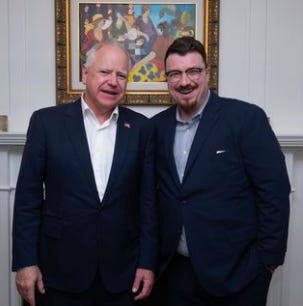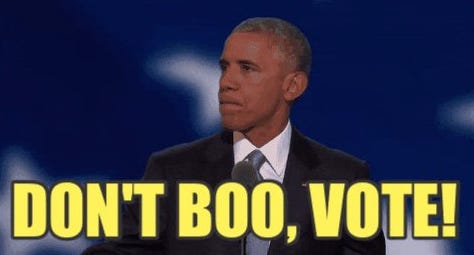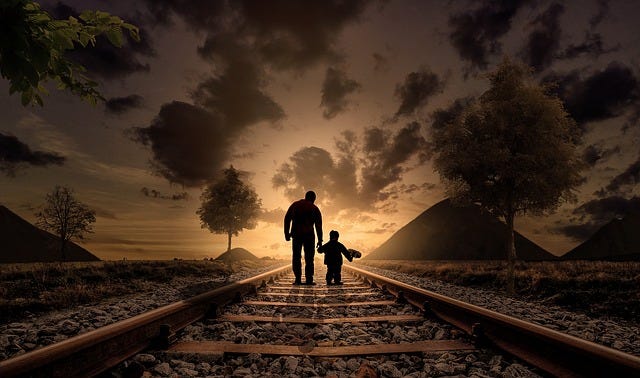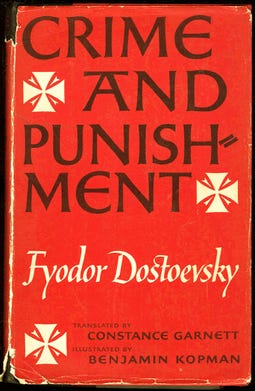What Now? A Meditation on Citizenship
Tuesday’s results are not a verdict, they are a diagnosis. We have lost what it means to be a ‘healthy citizen’.
It’s no secret. I have a bias, one that is most easily described as a preference for social democracy. Trump’s initial win in 2016 was my motivator to move to Washington, D.C. and receive my MA in Political Communication. I wanted to make a difference, to move the country away from the politics he represented. As is obvious as you read this, I haven’t achieved my goal.
Now that you know my bias, you can easily guess how I’ve voted in every election since I cast my first ballot in 2008. You’ll also gather that I was disappointed by Trump’s reelection.

Like the ‘day-after’ in 2016, the 2024 edition wasn’t fun. However, I was not stunned or sad like I was on November 9th, 2016. In fact, as I began interacting with friends and loved ones, I realized my calm was coming off as disinterest. They thought I didn’t care - and a couple seemed annoyed with my emotional distance and my ‘well, yeah, we get what we deserve’-style cynicism.
But the cynical impression is far from the truth! I hold my values dear, and yesterday was a moment of reflection for me, as it might have been for you. Now that another day has gone by, I feel ready to share my first distillation of what comes next.
I resisted rushing a reaction to avoid participating in the noise. I have thoughts on policies we need going forward, but in a moment like this, that is far too simple a narrative. As I looked deeper yesterday, I decided the core issue of the modern era is one of citizenship.
First, when I write citizenship, I do not mean it in a legal sense, though that matters too. What I mean is a weightier sense of what it means to be a member of society. Before you dismiss this analysis as a disgruntled middle-aged man yelling out the window that ‘we live in a society, dangit!’, hear me out.
About a week ago, I was discussing voting with a friend leaning towards a third-party option. She was furious about the events in Gaza, and wanted an option that didn’t imply an endorsement of the Biden Administration’s support for Israel’s Netanyahu. She decided to vote for Jill Stein when her more ‘natural’ vote in normal circumstances would be to vote for Harris.
Such a decision would generally trigger the ever-loving [redacted] out of me. I’ve always had a particular disdain for what I see as protest votes (see my 2016 cycle YouTube collaboration with Mr. Beat on third-party spoilers), and given my sincere belief that the survival of our democratic republic is at stake in the coming years, the idea of giving a candidate with no chance a vote over a single issue seemed outrageous. That’s especially true when that vote would otherwise go in the stack of a candidate with values mostly aligned on other issues. But let’s focus…
My reaction to my friend was far softer than I expected from myself. Why? First and foremost, we both live in Washington, D.C., so our decision is ultimately immaterial. I told my friend my reaction to her would be far different were we registered to vote in Arizona, Pennsylvania or Michigan. But as we weren’t in those states, the conversation continued more amiably.
I’ll spare you the back-and-forth. Here’s where the chat ended: we both agreed that a vote is only a single action a citizen takes, and a small, infrequent one at that. There is much more we do in a day, week, year or lifetime that affects our profile as a member of society. When we interlink our individual behaviors on a mass scale, we see the health of our community, be it a family, city, country or globe.
By the standard of citizenship, Tuesday’s results are not a verdict, they are a diagnosis. We are sick as individuals; we are sick as a society. We have lost what it means to be a ‘healthy citizen’.
To be clear, I do not diagnose in a puritanical sense of right and wrong. I include myself and do not pass judgment. However, if you consider our levels of loneliness and anger, our division and our despair, the idea of societal illness no longer seems derisive, instead cliche.
In the remainder of this text, I wish to offer remedies, though I reserve the right to alter interventions as any good doctor might over the course of treatment. And since I am also a citizen, I promise to join you with any prescription.
Voting as complete citizenship
The majority of us (barely) vote every presidential cycle; a minority will participate in midterms, an even smaller number in annual local elections or party primaries. For most people, voting is something done one day every four years. The other 1,459 days are spent working, loving, suffering, surviving. The actions we take in this time matter too.
However, listening to Democratic party leaders in the years since 2016, you might get the impression that citizenship amounts simply to voting. “Don’t boo, vote!” said Obama. Now that voting numbers have come back insufficient for 2024, an emphasis has been placed on those Democrats who voted in 2020, but failed to show this cycle. Further, Internet commentariat have fumed at the ~100 million Americans who never vote. It goes like this:
‘They’re Americans, they’re citizens. They won’t even bother to show up to vote?! That’s the one thing society asks besides paying taxes! What is wrong with all of them!?!?’
And of course this is criticism I agree with. People should vote. With the exception of some on the socialist left, there is general consensus that people should participate in electoral politics, as imperfect as electoral politics might be. But that criticism is also insufficient, leaving out the other parts of being a citizen - parts of being a citizen that might ultimately lead us to better electoral outcomes.
In short, if our leaders asked more of us than simply voting - and if we asked more of ourselves, our society would benefit. For example…
Intervention One: Family
Family is an important part of citizenship. This is hardly a new thought: Aristotle identified the family as the smallest political unit, and every human inside it as a ‘political animal’. And yet, “family is important” is a phrase that immediately brings to mind right-wing extremes, like “Focus on the Family” policies that dismiss LGBT people and propose the continued rollback of women’s liberation. In my opinion, it’s a shame ‘family’ has become synonymous with ‘hate’ for so many - it’s a shame on those who are hateful; it’s also a shame on us who have failed to offer a positive vision for ‘family’ too.
Life is too difficult to pursue alone. The obligations of work and finance are difficult enough, but we’re often expected to cook and exercise, raise a family, volunteer and keep hobbies - oh and don’t forget to relax, sleep eight hours and ‘have a balance’ in all these things, whatever that means!
The simple solution since homo sapiens began bipedal exploration is to form a family to help each other share the burden of life, to celebrate in times good, to commiserate during difficulties or illness.
And in my view, ‘family’ doesn’t mean ‘blood’ relatives only. One reason the title of the show ‘Modern Family’ helped it break through in popularity must be because it is recognized that family can mean many things, be it a group of genetic relatives or ‘found family’ that loves and supports one another.
But our society is built on the primacy of the rugged individual. That means leaning on family for love and support (or even shelter!) often comes with a sense of shame and failure. When someone feels shame for needing help, they must also feel resentment towards those around them. This damages their sense of belonging; this weakens their profile as a citizen. This hurts us all.
This is something the new right has latched onto. There is despair that accompanies isolation. There is depravity that many must live far from family for economic reasons. The political right’s offer is to reinstitute the ‘traditional family’ and ‘traditional moral values’, which is why I don’t subscribe to right-wing views, but the underlying prognosis is correct. We need our loved ones. We need people who care and support us, and we need to be physically close to a significant number of people that fit this description.
In my own life, I have taken time this year to see family more often. Rather than take the minimum viable days away to attend my cousin’s wedding, I spent a full week with him beforehand (being helpful with pre-wedding stuff, of course). I did the same for my sister’s wedding this summer. This fall, I spent a considerable time with my mom’s family when she had surgery. And I’ve just arranged with my dad to go visit my aging grandfather this winter.
Perhaps all this ‘family prioritization’ seems simple to you, but it is so, so easy to let time slip by without seeing the people we care about. It was a privilege to be able to do differently this year, and I recommend it for you too. It’s wonderful for its own sake (though families are maddening sometimes, no doubt). It’s also a critical part of being a political animal, a member of society, and a citizen. Be it traditional family or ‘found family’, go searching, my friends!
Work
“Work” is often seen as independent of our obligations as citizens. In the neoliberal worldview, pursuing money is a good in and of itself - if we prosper we spend our earnings and buoy those around us without extra effort. Because this effect is automatic, there’s no need for an intellectual link to citizenship.
But of course we all know better. A prosperous salary does not mean one’s work is virtuous, otherwise teachers would be the richest folks on earth. On the other hand, we know we can’t overemphasize a person’s worth through their work. First, because most people don’t enjoy that much agency in selling their labor - they work to survive. Second, because we know it can become a trap for self-esteem and happiness.
Millennials are stereotyped for pursuing our passions through work; we want jobs that “matter”. I know that’s what I always dreamed of in undergraduate and graduate school - and admittedly, it’s what I pursue to this day. However, over-identifying with our work can be problematic for self-worth. Even prestigious jobs can feel empty and meaningless, and that can make us feel empty and meaningless.
Leaning too far into the idea that prosperity for the individual is always good for wider society, or overemphasizing the idea of ‘meaningful’ work can both lead to suffering. A middle ground is needed if we are to integrate “work” into a model of citizenship.
Therefore, I propose a simple solution. To the extent that you can, find work that aligns with your values. If you have a choice between a living wage at Give Babies Hugs Inc. or massive salary at Give Babies Tobacco Inc., your choice is clear. If you aren’t so lucky to have a career perfectly aligned with ‘The Good’, as most of us aren’t, bring your values into whatever work you do. Be kind to colleagues, advocate for living wages and stability for all members of your team, speak up for justice in the workplace even if it puts you at odds with leadership. I’ve done this in my career. Even though it wasn’t always to my advantage, I have no regrets.
Surprise! Like family, our work is part of how we interface with society. Our work-life therefore interfaces with citizenship. With greater stability and justice for yourself and others, with more dignity in selling labor, we can reduce suffering and therefore resentment. This is good.
Of course, “work” can also be done outside of earning a wage. We can work in a garden to feed others, or we work in the home to make it ‘homey’. We can volunteer in our communities, or we can write post-election diatribes in hopes of helping others. However we work, remember that we are never in isolation; our actions have an impact on those around us, affecting the health of society at-large.
Gratitude & Spirituality
Emphasizing family and work-life as part of citizenship flirts with the cliche (or even boring!). Likewise, offering the idea that the political right and communitarian societies (like China) might have a vision for looking beyond ourselves and towards others isn’t very deep. So for my final two suggestions for better ‘citizenship health’, let me return to life as an individual.
First, gratitude to fight despair. Last year I finally read Dostoevsky’s Crime and Punishment. I’ve avoided reading or listening to analysis online because of a desire to avoid pop psychologists and self-help gurus. On my own, I’ve taken one profundity from this classic piece of literature - And that is that our lives are often not as moribund as we imagine.
The protagonist of Crime and Punishment is Raskolnikov, who commits (no spoilers) … a crime and receives…punishment. One thing that stuck out to me while reading was how miserable Raskolnikov was, even though his personal circumstance didn’t always match his material circumstance. Therefore, a lot of his ‘punishment’ is self-inflicted and psychological.
If you read the book, it won’t be long before you encounter Raskolnikov’s uncomfortable living arrangement in 1860s St. Petersburg. He’s short on money and lives in a sad apartment. I wouldn’t be particularly happy were I to trade places with him.
And yet, the true misery of Raskolnikov, and the source of his anti-social, anti-citizen behavior comes from within. Despite the fact those around him care for him: he has a concerned family, he has friends, he even has a landlady that makes him tea - despite all this, he unplugs completely from them all. When he does this, he unplugs from wider society, and violates a basic tenant of citizenship - respecting the life of other citizens.
To me, Raskolnikov has what a modern psychologist might call ‘black and white thinking’.
And yes, this point has some intersections with Buddhism and Cognitive Behavioral Therapy. Raskolnikov’s life isn’t great, but it isn’t all bad. Nonetheless, he won’t see anything but the bad - if he engages with life at all, and seems convinced absolutely nothing is good. With no hope, he drifts into his dismal and pathetic behavior.
In this way, Raskolnikov seems downright modern (perhaps that’s why this story is so highly recommended today). We all know things in life can be bad, but we often fail - no, refuse to see the good.
I’m guilty of this. For example, when things don’t go my way in my career, when my condo neighbors are too loud, when my shape in the mirror isn’t to my liking - when literally any one thing is not ideal in my life, I cannot see past it. My internal narrative becomes hyper focused on the negative - I’m trapped.
Some may have seen my YouTube explanation on my experience with eating disorder therapy. One surprising aspect of eating disorder treatment for me was the lack of focus on the act of eating food. Instead, tools from cognitive behavioral therapy (and adjacent therapies) were used to break my internal narratives about who I was and what my circumstances were.
For example, as corny as it sounds, I learned that rather than always treating food as the enemy, I might instead count my blessings: I had access and means to feed myself. This narrative shift didn’t only help change my relationship to dietary nourishment, but psychological nourishment as well.
This isn’t an advocacy for bro-stoicism. It is not to suggest that changing your mindset is a valid replacement for changing your material circumstance. It’s only to say that our internal dialogue is always running, whether we realize it consciously or not. What is yours saying?
Narrative and behavior are more symbiotic than we realize. Raskolnikov was unable to escape his own narrative, and in my reading, that had a one-to-one impact on his behavior as a member of his community, his family, and as a Russian citizen.
Pick your battles
Last, I’d like to leave the ignored parts of citizenship, and go the other direction. We’ve addressed the overemphasis on voting. There is another overemphasized part of citizenship: fighting.
In the wake of Trump’s reelection, we’ve heard the rhetoric of the results as a ‘battlecry’: it is not time for crying! It’s time to fight. This is true. We should stand for our values and fight for democracy, if necessary.
There are a couple issues with the point though. First, a ‘call to fight’ now ignores the millions that already fought - they donated, canvassed, volunteered, voted, posted, etc. Second, this general ‘call to fight’ is unfocused, and that is bad. An unfocused desire for a ‘fight’ is what led to the insurrection on January 6th. There must be a better way.
For this lesson, I prefer the wisdom of George Orwell.
Orwell is one of my idols as a writer - and he is imperfect, as all idols (and writers) are. One of the reasons I admire him is because he chose to live out his values by fighting fascism during Spain’s Civil War, 1936-39.
And with ‘fight fascism’, I don’t mean show up and protest. I don’t mean lollygag in Madrid while printing Spanish Republican propaganda (looking at you, Hemingway). I mean literally fighting fascism in the POUM militia, which Orwell joined upon arrival in Barcelona. His story of doing so is brilliantly and accessibly detailed in his book Homage to Catalonia, which I recommend.
Towards the beginning and the end of the book are Orwell’s most straightforward descriptions of his motivation. In V, he writes, “For years past the so-called democratic countries had been surrendering to Fascism at every step.” The last sentence of the book ends with describing his fellow English, who were “all sleeping the deep, deep sleep of England, from which I sometimes fear that we shall never wake till we are jerked out of it by the roar of bombs.” His prediction came true in World War II.
I take a couple lessons from Orwell’s time in Spain. One of the lessons is that despite best efforts, the arch of history does not bend toward justice, as Martin Luther King Jr. suggested. Orwell was forced from Spain by Republican infighting, and the Spanish Republic eventually fell to Franco’s Nationalists. Francisco Franco died peacefully in his sleep as an undisputed dictator decades later. History is no fairytale. We can fight and lose.
That leads to the other lesson: if we can lose even if we fight a just fight, we must therefore carefully pick our battles. Orwell wrote democracies had been losing to fascism “for years”, yet he waited for a showdown in Spain to enter the fight himself. Why 1937 Spain was Orwell’s chosen moment isn’t important. The lesson for us is that we must think and not flail.
There will come countless moments in the coming Administration to ‘fight’, to stand up for what we believe in, protest, disobey, take risks - many will be worthy. As citizens of the United States (or as cosmopolitan comrades, for Orwell’s sake), we must pick our moments carefully.
If the fight is as existential as it seems, we must choose wisely.
Closing
Electoral politics is the tip of the iceberg. I love Tolstoy’s description in War and Peace of history, which he says is like an ocean. Historical figures, like Napoleon and Tsar Alexander, are imagined as the mere white wake of waves that sputter atop vast depths.
To iterate a bit, our behavior as citizens represents the depths of the ocean. The tides of history are moved with a beautiful combination of physics and mystery. Those who rise to power are only the small results that rise to the visible level of the ocean’s surface. And because our leaders are visible, we look. And that is important.
But more important are the depths. To be a citizen is to embrace the subtlety and frustration of exploring vast oceans. To avoid despair and drowning, we must swim.










This is an excellent and thoughtful piece. Thank you. Your notion about the conflict between rugged individualism, family, help and shame is core to our national pathological dilemma and something I see played out every day in institutions as an organizational development consultant.
This is the kind of writing and focus that physically gets my mental juices jazzed. I want to ponder it some more and see what it evokes in me.
By the way, I share your bias.
In addition to my work as an organization development consultant I have also been a traditional folk singer of the Anglo-Celtic tradition for many years. Two touchpints to this current moment are, of course, singing in protest in the 69’s but also 18th century British movements like the Chartists, the Diggers and others. Reminders that we and others have been here before.
You may have inspired me to finally start my own Substack
You’re young, I won’t hold it against you. “A conservative is a liberal who got mugged by reality.” - Rush Limbaugh. There’s so much indoctrination to unpack, more today than when I was young. I love lessons from history, and getting different perspectives to form my own opinions, that’s why I followed you. My request is that you be more specific, don’t ramble so much. It’s hard to hold a conversation when you’re all over the place, a waste of time actually. But since you’re getting started I’ll give you a little grave. I voted for Trump 3 times. I’m a military veteran, father, and I Jesus Christ is my King. That gives you my “perspective”. Here’s a subject I would like you to address: these mail it in, ballot harvesting, machine counting, unverified citizenship, never ending counting so-called “free and fair elections” that should be conducted, counted and winners announced by the next day, but instead drag on for obvious nefarious (corrupt) reasons. “It’s not who votes, but who counts the votes that matters.” - Vladimir Lenin